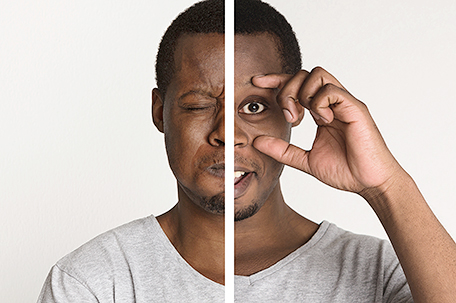
WWW.MENTALHEALTHAMERICA.NET
Every person, regardless of race or ethnicity, should seek help if they have a mental health problem or symptoms of a mental disorder.
— David Satcher, M.D., Former U.S. Surgeon General
An estimated 2.3 million Americans have bipolar disorder, also called manic-depressive illness. A person with bipolar disorder can go from feeling very, very high (called mania) to feeling very, very low (depression). With proper treatment, people can control these mood swings and lead fulfilling lives. While the rate of bipolar disorder is the same among African- Americans as it is among other Americans, African-Americans are less likely to receive a diagnosis and, therefore, treatment for this illness.
Most African Americans with bipolar disorder are going undiagnosed and untreated.
Several factors have contributed to African-Americans not receiving help for bipolar disorder and other mental illnesses. Some of the reasons are:
- A mistrust of health professionals, based in part on historically higher-than-average institutionalization of African-Americans with mental illness and on previous mistreatments, like such tragic events as the Tuskegee syphilis study.
- Cultural barriers between many doctors and their patients.
- Reliance on family and religious community, rather than mental health professionals, during times of emotional distress.
- A tendency to talk about physical problems, rather than discuss mental symptoms, or to mask symptoms with substance abuse or other medical conditions.
- Socioeconomic factors which can limit access to medical and mental health care — about 25 percent of African-Americans do not have health insurance.
- Continued misunderstanding and stigma about mental illness.
Signs of bipolar disorder
Bipolar disorder often starts in the teen years, but can emerge in later life. It is a potentially life-threatening illness that a person cannot handle alone. Tragically, one of five people with bipolar disorder commits suicide. The signs of bipolar disorder include:
MANIA
- Excessive energy, restlessness, racing thoughts and rapid talking
- Denial that anything is wrong
- Extremely happy feelings
- Easily irritated
- Needing little sleep
- Unrealistic belief in one’s ability
- Poor judgment
- Sustained, unusual behavior
- Increased sex drive
- Substance abuse
- Aggressive behavior
- Paranoia
DEPRESSION
- Poor appetite or eating too much
- Trouble sleeping or sleeping too much
- Nervousness and worry
- Loss of interest in and withdrawal from usual activities
- Feelings of sadness that don’t go away
- Irritability or restlessness
- Lack of energy
- Feelings of sadness, worthlessness or guilt
- Inability to think or concentrate
- Repeated thoughts of death or suicide
- Chronic pain or other physical problems that don’t respond to treatment
- Increased risk-taking behavior, including reckless driving or substance abuse
No one knows for certain what causes bipolar disorder. But its causes may include:
Brain chemistry – There are chemical changes or imbalances in the brain during both extremes of behavior (mania and depression).
Genetics – Close relatives of people with bipolar disorder are 10 to 20 times more likely to get depression or bipolar disorder than other people.
Drug and alcohol abuse – More than half of the people diagnosed with bipolar disorder have histories of substance abuse. In some cases, substance abuse precedes the development of the problem; in others, alcohol or other drugs may be used as a form of self-medication.
Stressful or disturbing events – Both can cause mood swings
Bipolar disorder can be treated.
There is hope. People with bipolar disorder can be helped by treatment. Treatment can include:
- Medication – The doctor may recommend one or more medicines to find what works best.
- Counseling – Often, psychotherapy or other forms of counseling are used in combination with medication.
- Peer Support – The advice and support of others who have bipolar disorder can aid recovery.
- Complementary Care – Some people benefit from exercise, stress reduction classes and other activities to complement their treatment and help them manage their illness.
ECT, or electroconvulsive therapy – This is used as a last resort to treat severe bouts of depression and suicidal thoughts. It’s only considered when medication and therapy haven’t worked.
If you think that you or someone you know has bipolar disorder, talk with your primary care physician or faith leader. However, only a mental health professional can tell if a person has bipolar disorder and properly treat it. Once in treatment, it is important that the person receive the support and understanding of friends and family. Many people also find strength and support through their religious and spiritual affiliations.
Other Resources:
National Medical Association
(for a list of African American doctors)
(888) 662-7497
Black Psychiatrists of America
(510) 834-7103
American Association of Pastoral Counselors
(703) 385-6967
Depression and Bipolar Support Alliance (DBSA)
730 N. Franklin Street, Suite 501
Chicago, IL 60610-7204
Phone Number: (312) 642-0049
Toll-Free Number: (800) 826-3632
Fax Number: (312) 642-7243
Website URL: www.dbsalliance.org
American Psychiatric Association
1000 Wilson Blvd, Suite 1825
Arlington, VA 22209-3901
Phone Number: (703) 907-7300
Email Address: [email protected]
Website URL: www.psych.org
This fact sheet was made possible through an unrestricted educational grant from GlaxoSmithKline.















Leave a Comment